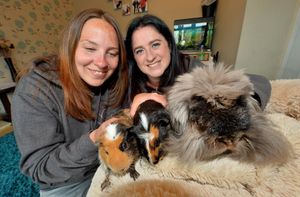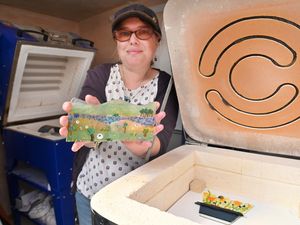Passionate Pepper's gives pets a second chance
Pets have been many people’s lifeline during lockdown, providing much-needed companionship.

But it’s also been a tough time for owners who have been forced to give up their animals due to lost jobs or furlough.
The pandemic has also led to an influx of abandoned pregnant cats and kittens because Covid restrictions limited the number of vets carrying out neutering procedures.
Helping to give the animals a second chance is Pepper’s Pet Rescue which was founded in Halesowen by Sophie and Andy Pepper in August 2018.
Since that time, they have rehomed more than 500 unwanted, abandoned and stray pets, nursing many back to health. With the support of a small team of volunteers, they are currently caring for around 70 animals, from cats and dogs to guinea pigs and gerbils.
Former nurse Sophie, 34, says the centre was first set up as a distraction while their son, Toby, now six, recovered from brain surgery.
“We used to foster dogs for a few rescue centres, including dogs from Spain,” she said.”After my son had emergency brain surgery, my husband suggested we set up the rescue to keep our minds busy.
“I genuinely thought we would just have a couple of cats but has just grown and grown. During lockdown it’s been relentless. We now have a waiting list of animals waiting to come into the rescue.”
A typical day at the rescue, based at the couple’s home on the Lodgefield estate, starts with the breakfast time feeding.
The team then gives medication to any animals that need it which includes their diabetic feline resident Sid. Volunteers will then come in to clean out the pens and check that all the creatures are looking fit and well. They will also spend a bit of time giving those who want it some fuss and attention.
“In the evening, we do all the feeding, medication and cleaning again and let the pets stretch their legs. I’m also hand-rearing a kitten which needs feeding every four hours,” added Sophie.
Before a pet is rehomed, the team makes sure they have been fully vaccinated, neutered and microchipped as well being de-fleaed and wormed. Home checks are completed prior to adoption to ensure good homes for their charges. Sophie also takes in sick animals in the hope she can help them recover and find them new homes.
Sadly, this means there isn’t always a happy ending as sometimes, despite the team’s best efforts, they are just too ill to survive. “We lost two kittens within a day of each other last week. They were very poorly and their digestive systems weren’t working properly. I’m always with them at the end,” says mother-of-two Sophie.“It’s always heart-breaking when it happens,” Sophie added but you do harden to it because you would be constantly crying otherwise. But it’s still really sad when it happens.
“We recently had bad news about a cat that was a really poorly kitten but survived against the odds. He went to a new home and really settled. He was hit by a car and killed.”
But the sad times are outweighed by the number of happy endings when the team finds the perfect new home for one of their rescues.
“It’s lovely to see them settled in their new home and enjoying the life they should have had from the start,” said Sophie. “Most people keep us updated on how they are getting on and it’s lovely to see photos of them in their new home.”
She is also committed to taking in feral cats which is something very few rescue centres do and will devote time to helping them adjust to a home environment.
It’s something that takes a lot of patience and understanding, says 34-year-old Sophie.
“I spent a lot of time talking to them, giving them treats and getting them used to me. I take it very slowly. It’s easier with kittens because they are small enough to wrap in a towel and cuddle – although you still have to be careful. They are still tameable when they are older too,” she explains.
Those that can’t be tamed are released back to the area they came from, as long as it’s safe to do so, or a suitable location such as a farm, after being neutered.
Neutering cats is important not just to stop unwanted pregnancies but also to reduce the spread of serious diseases such as feline immunodeficiency virus (FIV) and feline leukaemia virus (FeLV),which are transmitted by cat bites and reproductive activity.
“During lockdown private vets were doing neutering but the PDSA weren’t, so that meant people who couldn’t afford to go to the vet and pay £60-£70 weren’t getting it done. They might have tried to keep the cat indoors but the children were at home, they’ve let it out and it’s come back pregnant. FIV is so preventable and the answer is simple – neutering. I would ask every pet owner who hasn’t already done so to neuter their cats and get them microchipped,” says Sophie.
All of the team’s work is funded by donations and they need between £4,000 and £6,000 every month just to cover their vet bills.
Pepper’s is in the process of applying for charity status and is also looking for premises for a shop they can useto help raise additional funds. “Our Facebook page has 4,000 likes, if every person donated just £1 that £4,000 would make a massive difference to us,” says Sophie.
See facebook.com/pepperspetrescue or donate at go fund.me/b846078e





